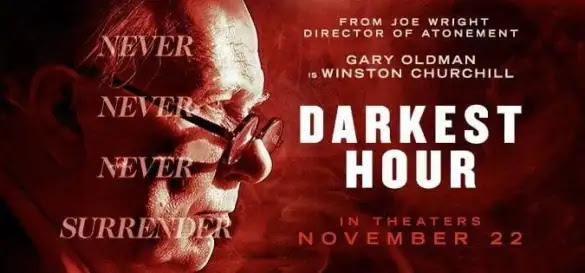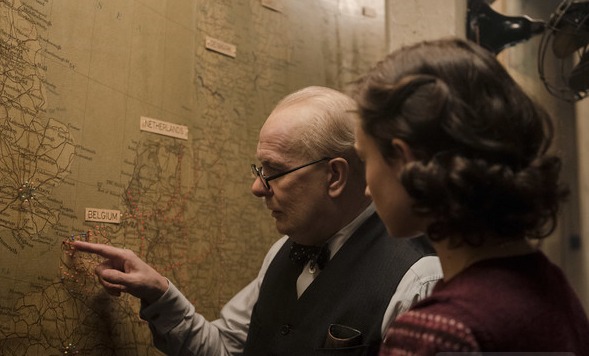There are a lot of movies, television shows, and documentaries about World War II. The History Channel at one point was nicknamed The Channel That Hitler Built in my household because it seemed like everything on it was about that war. There are countless numbers of films about the various battles as well as the heroics on all sides that led to the defeat of the Nazis and the fall of Adolph Hitler. While it is not unheard of, there are far fewer films that delve into the politics going on, especially with Great Britain during the earlier stages of the war, over how the rest of Europe was looking at Hitler and whether their citizens should even take up arms and fight or simply cower back and sign a non-aggression treaty and hope for the best.
During these times, the existing Prime Minister, Neville Chamberlain, was being asked to resign by the opposition Labour Party, which paved the way for Winston Churchill to take his place and rally supporters and the British citizens to declare they were not going to accept a peace treaty with Hitler’s Germany and would instead fight, even if it meant their extermination. It was a bold stance that not everyone in Parliament believed in, but it was what was necessary in the long run.
The film Darkest Hour narrows its focus to just a short period of time, punctuated by four speeches delivered by Winston Churchill (Gary Oldman). While the basics are accurate to the timeline, there are many smaller details that are either ignored or outright fabricated. In an attempt to endear Churchill to 21st-century audiences, his character is softened significantly. This is addressed in one of the first scenes when he initially throws an angry tantrum at his new secretary, Elizabeth (Lily James). Churchill’s wife, Clementine (Kristin Scott Thomas), calls him out for it and reminds him that he needs to come across more approachable and friendly, and, for the most part, he does, although that legendary temper of his does come out a time or two later.
This is not consistent with the known characterization of the real Winston Churchill, who barely acknowledged his staff and would never apologize or thank them. It’s a conceit of the film that history buffs will bristle at, but movie fans in general will appreciate. If you make your protagonist too unlikable, you lose any vested interest in seeing him succeed.
This film is so focused on the drama in Parliament and Winston Churchill’s struggles to convince his governmental peers to reject the proffered peace treaty that it never gives us any real glimpses of the actual war. Instead, we will hear snippets of what is going on at Dunkirk and the plans Churchill comes up with to rescue the soldiers trapped there. On top of that, there are many shots of the map in Churchill’s bunker with pins in them indicating where the Nazis are and how the various battles are going. We get a single overhead shot or a cratered landscape as it is getting bombed a second time, juxtaposed with an extreme close-up of a dead soldier’s face, the flames from the bombings in his eyes. Other than this, there is no real view of the actual war going on not far from there. We never see soldiers carrying firearms or marching into battle.
In contrast, this same year, director Christopher Nolan released his own World War II film, Dunkirk, which tells this same time period but strictly from the point-of-view of those at and around Dunkirk, ignoring the politics and drama happening elsewhere. Both films take extremely narrow points of view and expect audiences to either know the history or fill in the blanks on their own. This take allows each film to remain focused on the story they are trying to tell without getting bogged down with unnecessary exposition.
This is also a film that is custom-designed to get Gary Oldman his Oscar. He had been previously nominated for Tinker Tailor Soldier Spy and would be again nominated for Mank, but to date, Darkest Hour is his only win. Even though he is covered in prosthetics and make-up to make him look more like the obese Winston Churchill, there is never a time when I cannot see that it is Oldman in that role. I had the same problem in Oppenheimer when he was playing President Truman under a lot of makeup. Some thought he disappeared into the character and they didn’t recognize him, but I could always tell. He’s doing an amazing job replicating Churchill’s speech and mannerisms, but there is always just a little bit of the actor shining through it all.
As a red-blooded American, I was always taught that my country was the hero of World War II, swooping in to rescue Europe from the Nazis. What I wasn’t taught was that there was a load of bureaucracy keeping America from even lending a hand in the early years of it. All these trade agreements and such had been passed in America that were designed to prevent rendering aid during the war. We see this in action when Churchill calls up President Roosevelt seeking aid, or at the least a number of planes that Britain has already paid for. No aid is coming, and the only way the planes will ever be delivered is through some convoluted methods that involve using horses to haul them over the Canadian border; that or push them across manually. It’s eye-opening to think of what might have been had Japan not attacked Pearl Harbor and forced America into the war.
Aside from the ever-present threat of war with Germany, the central obstacle of the film is convincing Parliament not to sign a peace treaty with Germany. Viscount Halifax (Stephen Dillane), alongside recently removed former Prime Minister Neville Chamberlain (Ronald Pickup), has a good deal of sway among the members of Parliament and wishes to pursue the path of peace. Indeed, they even scheme to get written evidence that Churchill will not even entertain the idea of peace as a means to depose him from his office. But Churchill, after listening to the citizens of Britain, is able to convince Parliament that any peace treaty with Germany would enslave the people, most of whom would rather die fighting than live under the banner of the Nazi regime. His speech to Parliament is fiery, powerful, and wins over enough support that even the Conservative MPs have to accept defeat and side with him.
Most of the world knows the outcome of World War II and the basic details that led to the invasion of Berlin and the fall of the Nazis. That story is told ad nauseam in our history classes and in nearly every World War II documentary under the sun. The story of Darkest Hour, while not entirely original, does give us some of the history you don’t hear about all the time. Some of this film is fictionalized, mainly to appease a modern audience, but there is enough here to build up curiosity to seek out some of the many books out there that tell this part of history. The film is well made and even better acted. Even more important, though, is that it is far more interesting than a film about people arguing in conference rooms and debating war strategy should realistically be. This is truly an accomplishment of the film’s director, Joe Wright, and screenwriter Anthony McCarten, who also penned the Stephen Hawking biopic The Theory of Everything, another well made film with a tricky subject matter.
Academy Award Nominations:
Best Picture: Tim Bvan, Eric Fellner, Lisa Bruce, Anthony McCarten, and Douglas Urbanski
Best Actor: Gary Oldman (won)
Best Cinematography: Bruno Delbonnel
Best Costume Design: Jacqueline Durran
Best Makeup and Hairstyling: Kazuhiro Tsuji, David Malionowski, and Lucy Sibbick (won)
Best Production Design: Sarah Greenwood and Katie Spencer
____________________________________________________
Release Date: November 22, 2017
Running Time: 125 Minutes
Rated PG-13
Starring: Gary Oldman, Kristin Scott Thomas, Lily James, Stephen Dillane, Ronald Pickup, and Ben Mendelsohn
Directed By: Joe Wright









Comments
Post a Comment